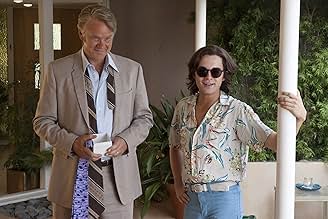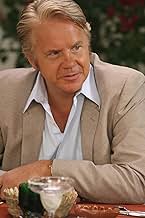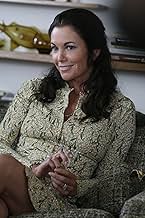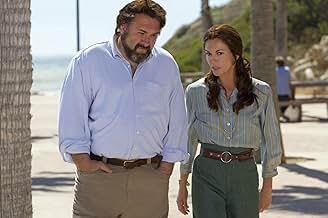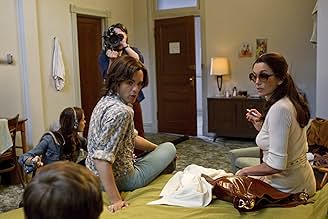ÉVALUATION IMDb
6,5/10
4,1 k
MA NOTE
Ajouter une intrigue dans votre langueA behind-the-scenes look at the making of the first American family to be the subjects of a reality TV show.A behind-the-scenes look at the making of the first American family to be the subjects of a reality TV show.A behind-the-scenes look at the making of the first American family to be the subjects of a reality TV show.
- Directors
- Writer
- Stars
- A remporté 1 prix Primetime Emmy
- 7 victoires et 34 nominations au total
Avis en vedette
I wasn't born when the Louds became a major deal in the American public consciousness, as the first sort of "reality" family, but that doesn't matter as I should still be able to take this story on its own terms (for example, what if hypothetically it was all made up, how would it work as a story unto itself). Of course the filmmakers are adept at taking real life and spinning it into docudrama - their breakout sensation was an adaptation of the real life guy who made the comic book American Splendor, Harvey Pekar, which included interviews with the real life subjects - so one would expect this to have some authenticity as it's all about the realm of what is real-real and camera-real. One wonders what the Maysles thought of this filmmaker Gilbert.
As it stands this man, played here by the late James Gandolfini (in the kind of performance that makes me miss him all the more, it's largely subtle work until the third act), is not exactly Maysles. I don't know how close they got to their subjects like the Beales (this made me think back to Grey Gardens quite a bit, also a "reality" movie in its way), but with the Louds it was the "All-American Family", and the ideal for Gilbert in the early 70's was to document it in an anthropological sense: what if aliens come down, after all, in a thousand years and want to see what we were like? It's easy to piece that together in drama, but then once you get the philosophies of Marshall MacLuhan into the mix, which this seems to also be alluding to throughout in a subtextual way, being 'natural' is difficult... at first.
This story of filmmakers following this family - which includes Tim Robbins and Diane Lane as the seemingly happy married couple of a bunch of interesting, happy kids (including one who is gay but quite happy to be in the scenes of Andy Warhol and the Chelsea Hotel and the like) - is certainly gripping for most of its run-time, and gains traction as the drama unfolds for the family. There's infidelity, there's marital strife, and there's Gilbert (usually in the background) with his cameraman and sound recordist in the house getting it all. Sometimes the family doesn't notice they're there. Then they do, and the looks to the camera give it away (maybe my favorite moment is when Robbins, as he's playing the patriarch in an exceedingly tragic and sad moment, gets a foolish grin on his face as he notices the camera as he's getting in his car - it's perfect, it's just how we all would be in that situation, to hide away the pain).
All of the actors can't be faulted in the slightest, and along with Gandolfini and Robbins it's hard to note point out Lane giving one of her best performances in recent memory. But there are times when things seem a little rushed... actually, a lot rushed in the final ten minutes or so, when the series finally airs on PBS and the family has to deal with the fallout. I wish we could see more of this, but the whole movie is only 90 minutes, and after giving us sort of a condensed 'greatest hits' of what this family and the filmmakers went through over several months (almost 80 days to be exact, however over much time I don't know), there seems like it's missing things. I wish there was more there there, and that may be a thing of 'no good movie is long enough' but it's more than that - by the time Cinema Verite wraps up what it has to say, and it's here that the Springer and Pulcini combine the dramatized with the actual of the family on Dick Cavette, it feels a little too little too late.
What if it had been more like 'Splendor', with combining the dramatized with the actual footage? Maybe HBO only gave them so much time, but it feels off in that way. But what is here is still mostly substantial for drama and pathos, and they even get us to feel for a character as lousy (at least from what we can see) as Mr. Loude, in part due to Robbins but also just solid writing. On the whole a little simplistically drawn, and at the same time in the small moments it carries a lot of worth. And to think how far we've come... or fallen, I should say, with what people will let themselves be seen as in "reality" television.
As it stands this man, played here by the late James Gandolfini (in the kind of performance that makes me miss him all the more, it's largely subtle work until the third act), is not exactly Maysles. I don't know how close they got to their subjects like the Beales (this made me think back to Grey Gardens quite a bit, also a "reality" movie in its way), but with the Louds it was the "All-American Family", and the ideal for Gilbert in the early 70's was to document it in an anthropological sense: what if aliens come down, after all, in a thousand years and want to see what we were like? It's easy to piece that together in drama, but then once you get the philosophies of Marshall MacLuhan into the mix, which this seems to also be alluding to throughout in a subtextual way, being 'natural' is difficult... at first.
This story of filmmakers following this family - which includes Tim Robbins and Diane Lane as the seemingly happy married couple of a bunch of interesting, happy kids (including one who is gay but quite happy to be in the scenes of Andy Warhol and the Chelsea Hotel and the like) - is certainly gripping for most of its run-time, and gains traction as the drama unfolds for the family. There's infidelity, there's marital strife, and there's Gilbert (usually in the background) with his cameraman and sound recordist in the house getting it all. Sometimes the family doesn't notice they're there. Then they do, and the looks to the camera give it away (maybe my favorite moment is when Robbins, as he's playing the patriarch in an exceedingly tragic and sad moment, gets a foolish grin on his face as he notices the camera as he's getting in his car - it's perfect, it's just how we all would be in that situation, to hide away the pain).
All of the actors can't be faulted in the slightest, and along with Gandolfini and Robbins it's hard to note point out Lane giving one of her best performances in recent memory. But there are times when things seem a little rushed... actually, a lot rushed in the final ten minutes or so, when the series finally airs on PBS and the family has to deal with the fallout. I wish we could see more of this, but the whole movie is only 90 minutes, and after giving us sort of a condensed 'greatest hits' of what this family and the filmmakers went through over several months (almost 80 days to be exact, however over much time I don't know), there seems like it's missing things. I wish there was more there there, and that may be a thing of 'no good movie is long enough' but it's more than that - by the time Cinema Verite wraps up what it has to say, and it's here that the Springer and Pulcini combine the dramatized with the actual of the family on Dick Cavette, it feels a little too little too late.
What if it had been more like 'Splendor', with combining the dramatized with the actual footage? Maybe HBO only gave them so much time, but it feels off in that way. But what is here is still mostly substantial for drama and pathos, and they even get us to feel for a character as lousy (at least from what we can see) as Mr. Loude, in part due to Robbins but also just solid writing. On the whole a little simplistically drawn, and at the same time in the small moments it carries a lot of worth. And to think how far we've come... or fallen, I should say, with what people will let themselves be seen as in "reality" television.
In 1971 an all American family from Santa Barbara in California were chosen, seemingly at random, to take part in a TV experiment. It was to become the world's first reality TV show called "An American Family" and its stars, the Loud family – both by name and at times by nature, were to become national phenomena.
But to get to legendary status the show's producer, Craig Gilbert, had a pretty hard sell to the board of TV company PBS who were reluctant, to say the least, to commit to the show and began to baulk at the cost of production as the film stock costs (in particular) began to mount.
Their concern was about the "view-ability" of the show and whether it would find an audience. They needn't have worried because what gradually emerged was a tale of a swinging misogynist father (Tim Robbins), a hopeless and helpless (but sultry in Gilbert's opinion) Mom played brilliantly by Diane Lane and a screamingly gay son, Lance, played gleefully by Thomas Dekker. Not to mention a looky-likey Rolling Stones band fronted by the other two boys.
But it's what's going on in the mind of Producer Gilbert (played masterfully by James Gandolfini with a very unlikely full beard and absolutely no gangster element whatsoever to draw on) that is the meat of the movie. Well, I say a movie but it's actually a documentary set within a drama, about a reality TV documentary that turns out larger than life than any drama.
At points we see side by side comparisons between the "real" family and the 2011 actors. It's uncanny. Gandolfini manipulates all sides as he makes the "action" more and more interesting but in doing so contributes to the family meltdown and the confidence of his crew. It's terrific.
I don't think this ever made it to cinema, it's an HBO production, but it's great and I saw it last night on Sky Atlantic so is likely to be repeated at some time. If it is tune in because it's a little gem.
But to get to legendary status the show's producer, Craig Gilbert, had a pretty hard sell to the board of TV company PBS who were reluctant, to say the least, to commit to the show and began to baulk at the cost of production as the film stock costs (in particular) began to mount.
Their concern was about the "view-ability" of the show and whether it would find an audience. They needn't have worried because what gradually emerged was a tale of a swinging misogynist father (Tim Robbins), a hopeless and helpless (but sultry in Gilbert's opinion) Mom played brilliantly by Diane Lane and a screamingly gay son, Lance, played gleefully by Thomas Dekker. Not to mention a looky-likey Rolling Stones band fronted by the other two boys.
But it's what's going on in the mind of Producer Gilbert (played masterfully by James Gandolfini with a very unlikely full beard and absolutely no gangster element whatsoever to draw on) that is the meat of the movie. Well, I say a movie but it's actually a documentary set within a drama, about a reality TV documentary that turns out larger than life than any drama.
At points we see side by side comparisons between the "real" family and the 2011 actors. It's uncanny. Gandolfini manipulates all sides as he makes the "action" more and more interesting but in doing so contributes to the family meltdown and the confidence of his crew. It's terrific.
I don't think this ever made it to cinema, it's an HBO production, but it's great and I saw it last night on Sky Atlantic so is likely to be repeated at some time. If it is tune in because it's a little gem.
Minor, though still entertaining cable-made docudrama from directors Shari Springer Berman and Robert Pulcini chronicling the would-be Sturm und Drang that went on behind-the-scenes of PBS's "American Family", an 11-hour television series in 1971 which presented the lives of The Louds, a "typical" family from Santa Barbara, CA. The Louds, who have since cemented their legacy as the first reality-TV family, brought in big ratings for the so-called "education network". Ordinary people, they were picked out of a society column by an ambitious producer and were followed around by a small camera-crew for some 78 days; still, high drama was hard to come by (patriarch Bill Loud had the wandering eye; eldest son Lance Loud was a flamboyant singer who had already moved to New York City when production began; while spouse Pat Loud, strong and confident, was the glue who kept kids and husband together). There wasn't much happening behind--nor in front of!--the lens, except for some mild flirting between Pat and the crafty, cunning producer, and Pat's discovery that her husband had been carrying on affairs with a number of different women. The editors of the actual show had a tough time piecing together enough watchable product, while this rendering of events, penned by the estimable David Seltzer, suffers the same fate. The groovy production-design is spot-on, and Diane Lane has several strong moments portraying Pat...yet this American family simply wasn't cliffhanger material. It all seems much ado about nothing.
These reality show movies are hard to watch. I did not hear about the Louds before. But it would have been interesting to watch what went wrong with America's sweetheart family. However, the script did not have enough punch to hold the interest for the entire time. James Gandolfini is such a good actor. He made an unlikeable character tolerable. Diane Lane was not quite believable as a gullible, wronged woman. Tim Robbins was watchable, however something was missing and I just didn't believe in his character. It started out fine, had a lot of potential when it moved to Manhattan, but somewhere down the second act, it lost its grip. Wish it had the momentum going somehow. Alas, it didn't end too well for me.
Naturally, it doesn't feel real. The first show of its kind, brought America into a debacle of sorts. Was this an "art form" or a voyeuristic trip into the unknown? Now, the whole thing feels manipulated, fragmented and utterly unreal. The gay son, brought the situation into the main stream but it was misunderstood, or was it? The one thing I got out of this films was a superlative performance by Diane Lane. She is truly extraordinary. But the task of reproducing the "moment" feels a bit all over the place. Going from highlight to highlight, if you didn't know about it you still won't really understand. This is no Truman Show. The dramatic structure seems not merely uncertain but downright opportunistic. Needless to say, I was disappointed.
Le saviez-vous
- AnecdotesIn the scene where Lance Loud is on the phone with his family, he reads a media description of himself and his "flamboyant, leech-like homosexuality". That's a direct quote from an article written for The New York Times by Anne Roiphe. She made equally scathing remarks about the entire Loud family.
- GaffesThe Louds' Mercedes has a California plate with the number style 1AAA000. These plates did not appear until 1980.
- ConnexionsFeatured in The Tonight Show with Jay Leno: Episode #19.129 (2011)
- Bandes originalesDream A Little Dream
Written by Fabian Andre, Gus Kahn & Wilbur Schwandt
Performed by Cass Elliot (as Mama Cass)
Courtesy of Geffen Records under license from Universal Music Enterprises
Meilleurs choix
Connectez-vous pour évaluer et surveiller les recommandations personnalisées
Détails
- Durée1 heure 26 minutes
- Couleur
- Mixage
- Rapport de forme
- 1.78 : 1
Contribuer à cette page
Suggérer une modification ou ajouter du contenu manquant

Lacune principale
By what name was Cinéma Vérité (2011) officially released in India in English?
Répondre

